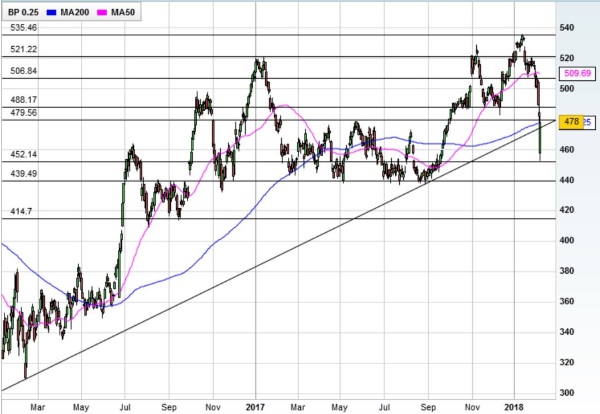High-yielding BP worth more than this
6th February 2018 14:14
by Graeme Evans from interactive investor
Share on
stole a march on its rivals today as the FTSE 100 giant produced annual results more in keeping with heightened expectations in the sector.
Whereas and were last week punished for falling short of these raised hopes, BP was given a more favourable reception following its five-fold jump in fourth-quarter earnings to $2.1 billion.
While market turmoil meant that the performance was not reflected in the share price movement, BP was still among the most resilient stocks of the day.
Chief executive Bob Dudley pointed out that it had been one of the strongest years in BP's recent history, with upstream production up 12% and the company entering the second year of its five-year strategy plan with "real momentum".
He is increasingly confident that the company can deliver growth, as well as improved cash flows and returns for shareholders to 2021 and beyond.
Significantly, cash flow from operations and including amounts relating to the Gulf of Mexico oil spill was more than double the previous year at $5.9 billion in the final quarter of 2017.
And thanks to ongoing discipline on costs and capital spending, BP has reduced its break-even point on oil prices to around $50 a barrel with a longer-term target of getting this figure down to between $35 and $40.
While oil prices recently spiked at $70 a barrel, BP believes that a more realistic benchmark price for the industry will be between $50 and $55 as more US shale production comes into the system.

These higher prices and BP's strong record of cash generation recently enabled the company to kick off a share buy-back programme in which it repurchased 51 million ordinary shares at a cost of $343 million in the fourth quarter.
Richard Hunter, head of markets at interactive investor, said: "The company's ability to generate cash remains prodigious, underpinning a supportive share buyback programme and a dividend yield of 6.2%, which has remained a stable source of income for investors over recent, leaner years."
UBS has a price target of 550p, which is based on a 2019 enterprise value multiple of 6.7x if oil prices are at $60 a barrel. This ratio represents a 15% premium to the five-year average and implies a 2019 projected dividend yield of 5.2%.
The investment bank has already said that the major oil companies are approaching the "sweet spot" for shareholder value, having been through the pain of resetting their financial models in order to deal with lower oil prices.
However, the recent round of results highlighted that the Big Oil firms still have some work to do. Shares in Exxon Mobil fell heavily on Friday after it missed profit forecasts, while Royal Dutch Shell was also lower after disappointing figures in downstream operations and on cash flow.
BP's downstream earnings were sharply higher but still short of market expectations, although the miss wasn't as large as others after recording a figure of $1.5 billion for the fourth quarter.
The company really shone in terms of its upstream operations, with profits up to $2.2 billion from $400 million for the same quarter a year earlier. This was 10% higher than forecasts after strong production growth and a 16% drop in costs.
BP achieved seven major project start-ups in 2017, which together with new developments in 2016 are expected to deliver operating cash margins around 35% higher than its upstream assets in 2015.
These articles are provided for information purposes only. Occasionally, an opinion about whether to buy or sell a specific investment may be provided by third parties. The content is not intended to be a personal recommendation, and is not provided based on an assessment of your investing knowledge and experience, your financial situation or your investment objectives. The value of your investments, and the income derived from them, may go down as well as up. You may not get back all the money that you invest. The investments referred to in this article may not be suitable for all investors, and if in doubt, an investor should seek advice from a qualified investment adviser.